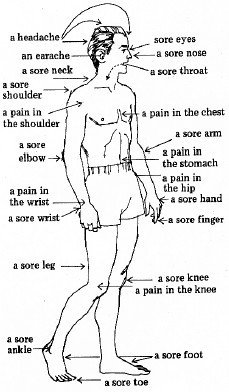PROGRAMME 25
第一部分對話:看病
這是醫生和病人的一段對話。
Dialogue 1
英語情景對話1
DOCTOR: Well, what's wrong?
PATIENT: A bad cold,I think…(咳嗽)
DOCT OR: Hmm.Got a bit of a cough?
PATIENT: Yes.
DOCTOR: Is your throat sore?
PATIENT: Yes.
DOCTOR: Let's have a look at it. Hmm. Say ah.
PATIENT: A-a-a-h.
DOCTOR: Have you taken anything for it?
PATIENT: Yes. Hot lemon drinks.
DOCTOR: Uh-huh. Let's check your temperature. Hmm. Yes. How's your head.
PATIENT: Well... I've got a bit of a headache.
DOCTOR: Hmm. Is your nose blocked?
PATIENT: Yes.
DOCTOR: Uh-huh. I see.
第二部分:英語詞匯表達
常見的病癥
a bad back 背疼;腰疼
a bit of a cold 輕微的感冒
a cough 咳嗽
an earache 耳朵疼
a headache 頭瘺
a pain in the stomach 胃疼;肚子疼
a sore throat 嗓子疼
a stomach-ache 胃疼;肚子疼
a toothache 牙疼
Uh-huh (這足一個非常口語化的說法,相當于漢語里的“嗯”)
其他有關健康的詞語
an aspirin 阿司匹林(既用作可數名詞,也用作不可數名詞)
a hot lemon drink 一杯熱檸檬汁
the flu 流行性感冒
Excuse me 對不起(打月賁嚏以后這樣說,向周圍的人表示歉意)
Have you taken anything for it? 吃過什么藥嗎?
I feel a bit off colour 我感覺不大舒服
Is your nose blocked? 鼻子通不通?
It'll probably clear up in a few days 這幾天可能就好了
Let's check your temperature 給你量量體溫吧
Not the best 有點兒不舒服
Say Ah 說“啊”(醫生要看嗓子)
something for your throat 治嗓子的約
What's wrong/the matter? 怎么啦?
You don't look a hundred percent 你看上去不大舒服
You don't look the best 你好象不大舒服
IDIOM:
A pain in the neck 令人討厭的人或事
第三部分:課程
TALKING ABOUT OUR HEALTH怎樣談論健康
1. GREETINGS+ENQUIRIES ABOUT HEALTH 打招呼與詢問健康
我們在打招呼的時候,通常都要詢問對方的健康。例如:
Hello! How're you?
How're you?是用來打招呼的一句話,
但它同時也足一句詢問健康的話。這句話需要回答,最常見的說法是:
Hello, how're you?
- Finer
How're you?
- Not bad.
聽到這種既是打招呼又是問好的話,在同答的時候,一般不詳細說明自己的健康狀況如何。但是如果的確身體不好,也可以說:
How're you?
- Not the best, actually.
2. FINDING OUT WHAT'S WRONG 詢問對方身體怎么不好
了解到對方身體不好以后,便可進一步詢問細節。例如:
JOHN:How're you?
BARBARA:Not the best,actually.
JOHN:Oh? What's the matter?
BARBARA: I've got a bit of a cold.
3. COMMENTING ON SOMEONE'S HEALTH/ APPEARANCE評論某人的健康或氣色
我們通常是在聽到對方說不舒服以后才評論他的氣色。例如:
BARBARA:I've got a bit of a cold.
JOHN:Mmm…you don't look a hundred percent.
然而,如果一個熟人好象病了,我們為了表示關心,也可以先說。例如:
JOHN:Hullo, Barbara. You don't look the best. What's wrong?
BARBARA:I've got a bad back, I'm afraid.
JOHN:That's too bad. Perhaps you should see the doctor.
4. ENQUIRIES ABOUT A SICK PERSON問候病人
如果我們知道某人病了,就可以給他打電話,或者親自新去問候。一般可以這樣說:
How're you today?
I'm feeling better.
How're you getting on?
I still feel a bit off colour.
Are you feeling better now?
Yes. a bit.
5. TALKING OF OUR AILMENTS自已有病
說自己有什么病,最常用的說法是:
I've got+病名。例如:
I've got a headache.
I've got a sore throat.
注意:
我們可以說I've got a toothache,也可以說I've got toothache, 可以說I've got an earache,也可以說I've got earache,但只能說I've got a headache,只能說I've got a stomach-ache,最后兩句一定要用冠詞。
The flu是influenza的簡略說法。在influenza前面不用冠詞。例如:I've got influenza.我們說I've got a bit of a cold.意思是感冒不歷害。然而有時我們故意用a bit這個短語來把嚴重的情況說得不那么嚴重。
例如:
JOHN:You look awful!Are you O.K.?
BARBARA: No, I'm not. I'm a bit off colour!
JOHN: What's the matter?
BARBARA: I've got a headache and an earache. And a sore throat and bit of a cough.
JOHN: You certainly are a bit off colour!
(請朗讀這段對話,注意讀音。)
第四部分:背景資料
人體某些部位疼痛示意圖。

注意:
sore一般指身體表面的疼痛,而pain和ache指體內的。因此,a sore ear指耳朵外部疼,而(an) earache 指耳朵里面疼。











